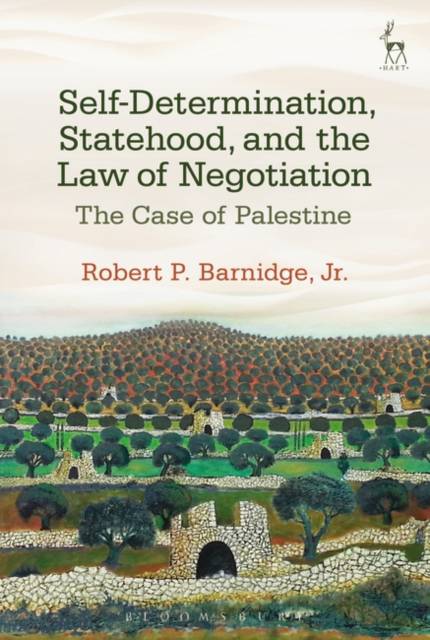
- Retrait gratuit dans votre magasin Club
- 7.000.000 titres dans notre catalogue
- Payer en toute sécurité
- Toujours un magasin près de chez vous
- Retrait gratuit dans votre magasin Club
- 7.000.0000 titres dans notre catalogue
- Payer en toute sécurité
- Toujours un magasin près de chez vous
Self-Determination, Statehood, and the Law of Negotiation
The Case of Palestine
Robert P Barnidge
Livre relié | Anglais
203,95 €
+ 407 points
Format
Description
From the Madrid Invitation in 1991 to the introduction of the Oslo process in 1993 to the present, a negotiated settlement has remained the dominant leitmotiv of peacemaking between Israel and the Palestinian people. That the parties have chosen negotiations means that either side's failure to comply with its obligation to negotiate can result in an internationally wrongful act and, in response, countermeasures and other responses. This monograph seeks to advance our understanding of the international law of negotiation and use this as a framework for assessing the Israeli-Palestinian dispute, with the Palestinian people's unsuccessful attempt to join the United Nations as a Member State in autumn 2011 and the successful attempt to join the same institution as a non-Member Observer State in November 2012 providing a case study for this. The legal consequences of these applications are not merely of historical interest; they inform the present rights and obligations of Israel and the Palestinian people. This work fills a significant gap in the existing international law scholarship on the Israeli-Palestinian dispute, which neither engages with this means of dispute settlement generally nor does so specifically within the context of the Palestinian people's engagements with international institutions.
'Based on primary research, this book explores materials that were not analyzed before. It treats a highly political issue with scientific objectivity that strikes a balance between various points of view. The book will be an essential reading to all those involved in peace studies, international negotiations and Israeli-Palestinian conflict'.
Mutaz M Qafisheh, Associate Professor of International Law, Hebron University.
'A compelling and innovative account of the legal aspects of the Palestinian-Israeli conflict: a must read.'
Efraim Karsh, King's College London and Bar-Ilan University, author of Palestine Betrayed.
'A superbly imagined and executed study on Palestine that puts the 'negotiation imperative' at the heart of its narrative, fully interrogating the involvement of public international law at each step of the long and layered history that is vigorously brought to life in these pages. A study that also promises texture, nuance, and depth to the legal analysis it offers-and it delivers handsomely on each of these fronts.'
-Dino Kritsiotis, Chair of Public International Law & Head of the International Humanitarian Law Unit, University of Nottingham.
'Based on primary research, this book explores materials that were not analyzed before. It treats a highly political issue with scientific objectivity that strikes a balance between various points of view. The book will be an essential reading to all those involved in peace studies, international negotiations and Israeli-Palestinian conflict'.
Mutaz M Qafisheh, Associate Professor of International Law, Hebron University.
'A compelling and innovative account of the legal aspects of the Palestinian-Israeli conflict: a must read.'
Efraim Karsh, King's College London and Bar-Ilan University, author of Palestine Betrayed.
'A superbly imagined and executed study on Palestine that puts the 'negotiation imperative' at the heart of its narrative, fully interrogating the involvement of public international law at each step of the long and layered history that is vigorously brought to life in these pages. A study that also promises texture, nuance, and depth to the legal analysis it offers-and it delivers handsomely on each of these fronts.'
-Dino Kritsiotis, Chair of Public International Law & Head of the International Humanitarian Law Unit, University of Nottingham.
Spécifications
Parties prenantes
- Auteur(s) :
- Editeur:
Contenu
- Nombre de pages :
- 264
- Langue:
- Anglais
Caractéristiques
- EAN:
- 9781849468121
- Date de parution :
- 28-01-16
- Format:
- Livre relié
- Format numérique:
- Genaaid
- Dimensions :
- 163 mm x 236 mm
- Poids :
- 589 g

Les avis
Nous publions uniquement les avis qui respectent les conditions requises. Consultez nos conditions pour les avis.






